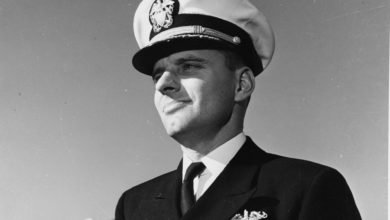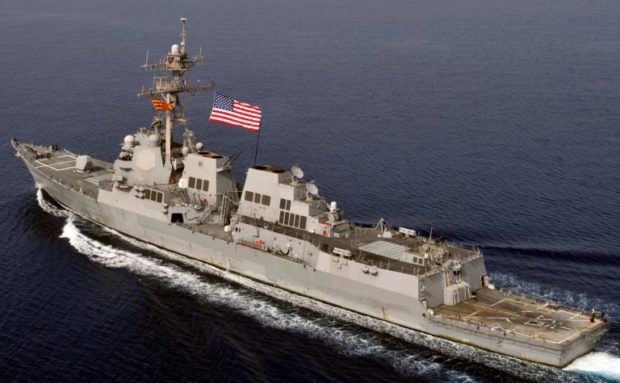Medal of Honor Monday: Army 1st Lt. Francis Burke
Extreme bouts of courage can take over a soldier thrust into the front lines of war. Army 1st Lt. Francis Burke is a shining example of one of those cases. In the waning days of World War II, he single-handedly took out a third of the German troops his unit faced in Nuremberg, Germany. For that, he earned the Medal of Honor.
Burke was born in New York City on Sept. 29, 1918. His family lived in the rough-and-tumble neighborhood of Hell’s Kitchen. Gangs were prevalent in the area at that time, so his parents moved the family across the Hudson River to Jersey City, New Jersey.
By the time Burke was 18, his interest in the military had peaked, so he joined the New Jersey Army National Guard. In 1941, he was called for active-duty as the U.S. entered World War II.
Burke was part of the Army’s 1st Battalion, 15th Infantry Regiment, 3rd Infantry Division, which served in North Africa and fought in the Battle of Anzio, Italy, before pushing through France into Germany. He fought gallantly for years, but it was at the war’s end that his most heroic moments unfolded.
On April 17, 1945, Burke’s regiment had fought its way into Nuremberg, where Adolph Hitler often held Nazi party conventions in the early days of the war. Now, the Allies were working to root out the few defenders the dwindling party had left.
As his battalion’s transportation officer, Burke had been in charge of selecting a motor pool site. But he wanted to help in the fight, so he moved in front of his unit’s riflemen on the front line. In doing so, he found a group of about 10 Germans preparing to counterattack.
In response, Burke ran to a nearby American company, grabbed a light machine gun and ammunition, and then returned to open fire on those Germans, who blasted him back with machine pistols, rifles and rocket launchers.
An enemy machine gun from a different location tried to take Burke out, too, but they were unsuccessful. Instead, the lieutenant killed them and then drove off the survivors of the enemy unit he had originally attacked.
Next, Burke grabbed a rifle and ran more than 100 yards through intense fire to engage some Germans hiding behind an abandoned tank. On his way, a sniper tried to pick him off from a cellar about 20 yards away. Burke ran straight for the cellar’s window, fired a full clip into it, and then jumped through the window to make sure he’d taken out the enemy.
Burke stopped for a minute after that to replace his jammed rifle and gather a few grenades before jumping right back into the fray.
When the shots he was firing weren’t hitting his newest targets, Burke pulled the pins from two grenades and, holding one in each hand, rushed the building in which they were hiding. Burke threw his grenades just as the Germans launched one at him.
All three exploded.
As the smoke cleared, the Germans lay dead where they had fallen. Burke, however, emerged relatively unscathed. He picked up his rifle and moved forward to take down four more Germans.
A bit dazed from the grenade explosions, Burke retired to the American lines, but he didn’t stop the fight. He jumped into a raging battle for another half-hour with a platoon that managed to fend off one group of Germans. Burke then joined another group of Allied soldiers, whose fierce firefighting skills took out a German unit armed with a .20 mm gun.
In four hours of action, Burke had taken the lead in the battle, single-handedly killing 11 enemy soldiers and wounded three more. He was responsible for 14 of the battle’s 43 casualties.
Burke’s extraordinary bravery inspired the men around him, and his actions helped hasten the fall of Nuremberg. Less than a month later, the Germans surrendered, and the war on the Western Front was over.
On Jan. 9, 1946, months after the war on both fronts ended, President Harry S. Truman presented Burke with the Medal of Honor. He remained in the National Guard for several more years, earning the rank of major before finally retiring from service.
While Burke marched in parades and occasionally spoke with high school students and on radio shows about what earned him the nation’s highest honor, his family said he was a humble man who never sought the spotlight.
Burke and his wife, Catherine, had four children and ran their own insurance agency for decades. He was still involved in the business when he died on Sept. 6, 1988, at age 69.
Burke was buried at Brig. Gen. William C. Doyle Veterans Memorial Cemetery in Wrightstown, New Jersey, where his legacy lives on. An administrative building at the cemetery was dedicated in honor of Burke, who is the only Medal of Honor recipient buried there.
A housing complex for the 1st Battalion, 15th Infantry Regiment, on Kelley Hill at Fort Benning, Georgia, was also named Burke Barracks in his honor.
This article is part of a weekly series called “Medal of Honor Monday,” in which we highlight one of the more than 3,500 Medal of Honor recipients who have earned the U.S. military’s highest medal for valor.
Source: Department of Defense
Content created by Conservative Daily News is available for re-publication without charge under the Creative Commons license. Visit our syndication page for details.



